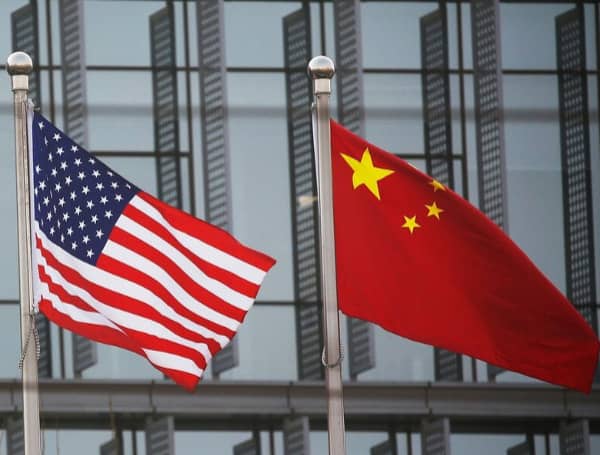Leaders from key U.S. House of Representatives committees today sent a letter to Department of Homeland Security (DHS) Secretary Kristi Noem, requesting a comprehensive threat assessment regarding what they describe as the People’s Republic of China’s (PRC) expanding intelligence and security collaboration with the Republic of Cuba.
The letter, signed by Homeland Security Committee Chairman Mark E. Green (R-TN), Select Committee on the CCP Chairman John Moolenaar (R-MI), Subcommittee on Transportation and Maritime Security Chairman Carlos A. Gimenez (R-FL), and Representatives Sheri Biggs (R-SC) and Elijah Crane (R-AZ), expresses grave concern over publicly available evidence suggesting the PRC is establishing or has established sophisticated signals intelligence (SIGINT) infrastructure in Cuba, located just 90 miles from the Florida coast.
READ: US Supreme Court Allows Trump Transgender Military Ban To Take Effect Pending Appeals
“The presence of such capabilities just 90 miles from the United States represents a serious and evolving threat to the homeland,” the lawmakers wrote. They argue that this poses “acute” security risks across the air, space, and maritime domains, allowing the PRC to potentially monitor U.S. detection and response capabilities, map electronic profiles of U.S. assets, and prepare the electromagnetic environment for future exploitation without direct conflict. The letter specifically highlights the proximity of suspected PRC-linked facilities to sensitive U.S. installations like Naval Station Guantánamo Bay, Kennedy Space Center, Naval Submarine Base Kings Bay, and Cape Canaveral Space Force Station.
The letter cites reports from the Center for Strategic and International Studies (CSIS), including one from July 1, 2024, identifying four suspected PRC-linked SIGINT facilities in Cuba: Bejucal, Wajay, Calabazar, and El Salao.
A subsequent CSIS report in December 2024 reportedly provided enhanced imagery and analysis. While recent satellite imagery from April 18, 2025, indicated construction cessation at El Salao, the letter notes that the Bejucal facility “continues to undergo significant upgrades,” including the installation of a circular disposed antenna array (CDAA) and repositioned satellite dishes, suggesting a focus on “long-range, wideband electromagnetic surveillance.” The Calabazar and Wajay sites are described as operational and supporting the network.
READ: Bernie Sanders Says Democrats Need A Working-Class Agenda, Slamming Trump Is ‘Not Good Enough’
These developments, the lawmakers contend, reflect a “deliberate expansion of the PRC’s surveillance infrastructure in the Western Hemisphere and signal a long-term investment in asymmetric capabilities near U.S. shores.”
The letter also links this suspected intelligence activity to deepening political and economic ties between Beijing and Havana, noting nearly $8 billion in PRC financing to Cuba since 2000 for infrastructure projects, including a nationwide telecommunications network largely built by sanctioned firms Huawei and ZTE. The integration of these technologies, they warn, “raises the specter of regional communications exposure to PRC-linked platforms.”
Further reinforcing their concerns, the lawmakers referenced recent testimony from General Dan “Razin” Caine, the newly confirmed Chairman of the Joint Chiefs of Staff. General Caine’s testimony from April 1, 2025, mentioned U.S. Cyber Command hunt-forward operations discovering PRC malware implanted within Latin American networks and reports of PRC technicians and advisors frequenting known or suspected intelligence sites in Cuba.
READ: GOP Senators Vow To Stop Attempt To Take California EV Mandate Nationwide
The letter warns that unchecked PRC activities in Cuba could establish a “forward operating base for electronic warfare, enable intelligence collection, and influence operations that directly undermine U.S. national security interests.”
Given the seriousness of the situation, the committee leaders requested a classified briefing and a detailed written update from DHS, specifically addressing:
- DHS’s current assessment of PRC intelligence-gathering operations and suspected SIGINT capabilities in Cuba.
- Known or suspected infrastructure developments or PRC-linked construction at Cuban military or dual-use facilities.
- DHS efforts to assess and mitigate risks from potential SIGINT interception of communications from DHS components, partner agencies, or U.S. critical infrastructure.
- The extent and effectiveness of DHS’s interagency coordination to monitor, analyze, and counter PRC intelligence and security activities in Cuba, the broader Caribbean, and the Western Hemisphere, including identifying any gaps.
- Steps taken by DHS to raise awareness about risks related to PRC surveillance platforms in Cuba among industry and government entities.
The letter cites the committees’ jurisdiction under House Rules and H. Res. 11 to oversee homeland security policy and investigate the Chinese Communist Party’s progress and competition with the United States.
Please make a small donation to the Tampa Free Press to help sustain independent journalism. Your contribution enables us to continue delivering high-quality, local, and national news coverage.
Connect with us: Follow the Tampa Free Press on Facebook and Twitter for breaking news and updates.
Sign up: Subscribe to our free newsletter for a curated selection of top stories delivered straight to your inbox.
